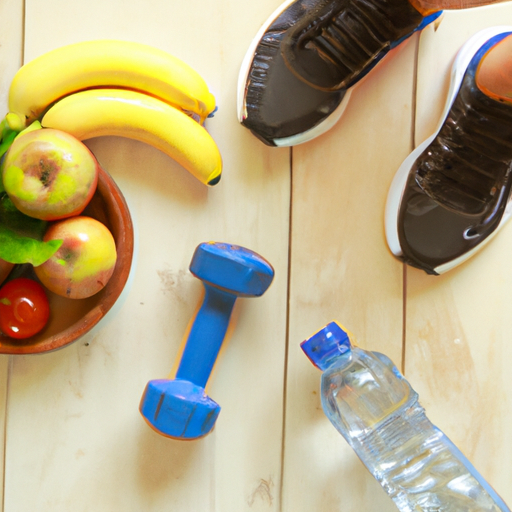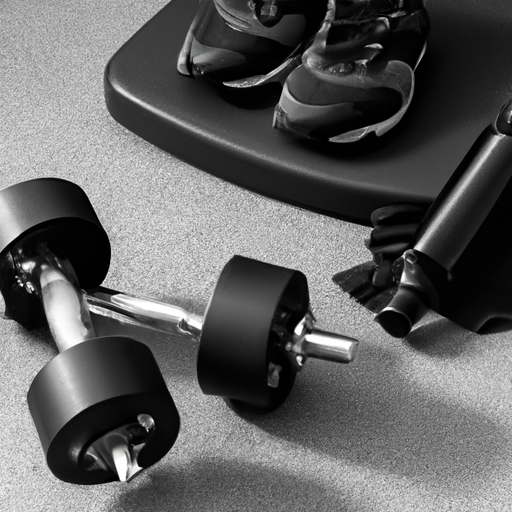
“Master Workout Nutrition 101: What To Eat Before And After Exercise” is a comprehensive guide that aims to provide you with valuable insights into optimizing your nutritional intake before and after your workout sessions. This resource will equip you with the knowledge necessary to make informed choices about your pre and post-exercise meals, enabling you to fuel your body effectively and enhance your overall fitness performance.
Within this guide, you will find expert advice on the ideal macro and micro-nutrients to consume prior to your workout, including the importance of carbohydrates and protein, as well as hydration strategies to support optimal performance. Additionally, you will discover the recommended post-workout dietary choices to aid in recovery, muscle repair, and replenishment of energy stores. By following the guidance provided in this resource, you can maximize the benefits of your exercise routine and ultimately achieve your fitness goals more efficiently.

More Information Here on Weight Loss
Pre-Workout Nutrition
Importance of pre-workout nutrition
Pre-workout nutrition plays a crucial role in optimizing performance and enhancing the outcomes of exercise. By providing the body with the right fuel and nutrients before a workout, you can increase your energy levels, improve endurance, and maximize muscle growth and recovery. It also helps prevent muscle catabolism by providing a readily available source of energy for the body to utilize during the workout.
Timing of pre-workout meal
The timing of your pre-workout meal is essential to ensure that you have enough energy to support your workout. Ideally, you should aim to eat a meal rich in carbohydrates and protein about 1-2 hours before exercising. This allows enough time for digestion and absorption of the nutrients, providing you with sustained energy throughout your workout. However, some individuals may find that they perform better with a smaller, easily digestible snack closer to their workout time.
Macronutrient composition of pre-workout meal
The macronutrient composition of your pre-workout meal should be balanced to provide you with the energy and nutrients needed to fuel your workout. It is recommended to consume a moderate amount of carbohydrates, as they are the body’s primary source of energy during exercise. Some excellent sources of carbohydrates for your pre-workout meal include whole grains, fruits, and vegetables. Additionally, including a lean source of protein, such as chicken, fish, or tofu, can help support muscle repair and growth during exercise.
Post-Workout Nutrition
Importance of post-workout nutrition
Post-workout nutrition is just as important as pre-workout nutrition, if not more so. During exercise, your body utilizes glycogen stores as fuel, and your muscles undergo micro-tears. Consuming the right nutrients after a workout helps replenish glycogen stores, repair damaged muscles, reduce muscle soreness, and promote faster recovery. It also supports muscle protein synthesis, which is crucial for muscle growth and strength gains.
Timing of post-workout meal
To maximize the benefits of post-workout nutrition, it is recommended to consume a meal or snack within 30 minutes to 2 hours after exercising. During this time, your body is most efficient at absorbing nutrients and utilizing them for muscle repair and recovery. The immediate post-workout window, often referred to as the “anabolic window,” is particularly crucial for replenishing glycogen stores and kickstarting the muscle repair process.
Macronutrient composition of post-workout meal
A well-balanced post-workout meal should include a combination of carbohydrates and protein. Carbohydrates help restore glycogen levels, while protein aids in muscle repair and growth. Aim to consume a 3:1 or 4:1 ratio of carbohydrates to protein in your post-workout meal. Foods such as lean meats, eggs, dairy products, and legumes are excellent sources of protein. Additionally, including some healthy fats, like avocado or nuts, can provide added nutrients and support overall recovery.
Protein
Role of protein in workout nutrition
Protein is a crucial macronutrient for workout nutrition as it plays many essential roles. It provides the building blocks for muscle repair and growth, helps regulate hormone production, and boosts immune function. Consuming an adequate amount of protein before and after exercise helps optimize muscle protein synthesis, leading to improved muscle recovery, increased strength, and enhanced performance.
Recommended protein intake
The recommended protein intake for individuals engaging in regular exercise is approximately 0.8-1 gram of protein per kilogram of body weight. However, athletes or those engaged in intense workouts may benefit from a higher protein intake of 1.2-2 grams per kilogram of body weight. It’s important to consider your individual needs, training intensity, and goals when determining your protein intake. Consulting with a registered dietitian or nutritionist can help ensure you’re meeting your protein requirements.
Sources of protein
There are numerous sources of protein that can be incorporated into your pre- and post-workout meals. Animal-based sources include lean meats, poultry, fish, eggs, and dairy products. Plant-based sources include legumes, tofu, tempeh, seitan, and a variety of nuts and seeds. It’s important to choose high-quality protein sources that provide all essential amino acids for optimal muscle repair and growth.

More Information Here on Weight Loss
Carbohydrates
Role of carbohydrates in workout nutrition
Carbohydrates are the body’s primary source of energy during exercise. Consuming carbohydrates before a workout helps provide the necessary fuel for high-intensity and prolonged activities. It also replenishes glycogen stores, reduces muscle fatigue, and improves exercise performance. Additionally, post-workout carbohydrates aid in glycogen resynthesis and prevent muscle breakdown.
Recommended carbohydrate intake
The recommended carbohydrate intake for individuals engaged in moderate to high-intensity exercise is approximately 3-5 grams per kilogram of body weight. However, those participating in endurance events or intense training may require higher carbohydrate intake of 5-8 grams per kilogram of body weight. It’s important to choose complex carbohydrates, such as whole grains, fruits, and vegetables, over refined and processed options for optimal nutrient intake and sustained energy levels.
Sources of carbohydrates
Including a variety of carbohydrates from different sources in your pre- and post-workout meals can provide a range of essential nutrients and fiber. Whole grains, such as quinoa, brown rice, and oats, are excellent sources of complex carbohydrates. Fruits and vegetables not only provide carbohydrates but also supply essential vitamins, minerals, and antioxidants. Adding in some starchy vegetables like sweet potatoes and legumes like chickpeas can further enhance your carbohydrate intake.
Fats
Role of fats in workout nutrition
Fats are an essential part of a balanced diet, even for workout nutrition. While carbohydrates are the primary energy source during exercise, fats provide a secondary source of fuel for low-intensity activities or longer-duration exercises. They also help regulate hormones, support brain health, and aid in the absorption of fat-soluble vitamins. Including healthy fats in your diet can enhance overall nutrient intake and promote optimal exercise performance.
Recommended fat intake
The recommended fat intake for individuals engaged in regular exercise is approximately 20-35% of total daily calories. It’s important to focus on consuming healthy fats, such as monounsaturated fats found in avocados, olive oil, and nuts, as well as polyunsaturated fats found in fatty fish, flaxseeds, and chia seeds. Limiting intake of saturated and trans fats, commonly found in fried foods and processed snacks, is crucial for maintaining optimal health.
Sources of fats
Incorporating sources of healthy fats into your pre- and post-workout meals can provide essential nutrients and support overall well-being. Avocados are a versatile and delicious source of monounsaturated fats that can be added to salads or used as a spread on toast. Nuts and seeds, such as almonds, walnuts, chia seeds, and flaxseeds, offer both healthy fats and additional protein. Fatty fish, such as salmon and tuna, are rich in omega-3 fatty acids, which have anti-inflammatory properties and support cardiovascular health.
Hydration
Importance of hydration during exercise
Hydration plays a critical role in maintaining optimal performance during exercise. Water is essential for regulating body temperature, lubricating joints, transporting nutrients, and eliminating waste products. Dehydration can lead to decreased endurance, reduced cognitive function, muscle cramps, and an increased risk of heat-related illnesses. Ensuring proper hydration before, during, and after exercise is vital for overall well-being and workout performance.
Pre-workout hydration
To ensure adequate hydration before exercise, aim to consume approximately 16-20 fluid ounces of water 2-3 hours before your workout. Additionally, drinking another 8-10 fluid ounces of water 10-20 minutes before exercising can help optimize hydration levels. It is also important to consider factors such as the intensity and duration of your exercise, temperature, and individual sweat rate when determining your fluid intake needs.
Post-workout hydration
Replenishing fluid and electrolyte losses post-workout is crucial for restoring hydration levels. As a general guideline, aim to drink at least 16-24 fluid ounces of water for every pound of body weight lost during exercise. Additionally, consuming beverages that contain electrolytes, such as sports drinks or coconut water, can help replace essential minerals lost through sweat and aid in rehydration.
Supplements
Types of workout supplements
While a well-balanced diet can provide all the necessary nutrients for optimal workout nutrition, some individuals may choose to incorporate supplements to support their fitness goals. Common workout supplements include protein powders, branch-chain amino acids (BCAAs), creatine, and pre-workout formulas. Protein powders can be a convenient way to increase protein intake, while BCAAs may aid in muscle recovery and reduce muscle soreness. Creatine supplementation has been shown to improve strength and power, and pre-workout formulas often contain a combination of ingredients to enhance energy and focus.
Benefits of workout supplements
Workout supplements can offer benefits such as increased muscle protein synthesis, improved exercise performance, enhanced recovery, and reduced muscle damage. They can also provide convenience and cost-effectiveness for individuals who have specific dietary restrictions or struggle to meet their nutrient needs through food alone. However, it’s important to note that supplements should not replace a well-balanced diet and should be used in conjunction with proper nutrition and exercise practices.
Recommendations for supplement use
Before incorporating any workout supplements into your routine, it is essential to consult with a healthcare professional, such as a registered dietitian or sports nutritionist. They can assess your individual needs, goals, and current dietary habits to determine if supplementation is necessary. Additionally, they can provide guidance on product quality, dosages, and potential interactions with medications or existing health conditions. An individualized and evidence-based approach ensures safe and effective supplement use.
Meal Ideas
Pre-workout meal ideas
When planning your pre-workout meal, it’s essential to choose foods that are easily digestible, provide sustained energy, and do not cause discomfort during exercise. Some examples of pre-workout meals include:
- Greek yogurt with berries and a drizzle of honey
- Oatmeal topped with sliced banana and a spoonful of almond butter
- Grilled chicken or salmon with quinoa and roasted vegetables
- Whole grain toast with avocado and scrambled eggs
Post-workout meal ideas
After a workout, aim to consume a balanced meal that includes carbohydrates to replenish glycogen stores and protein to support muscle repair and recovery. Here are some post-workout meal ideas:
- Grilled chicken or tofu with brown rice and steamed broccoli
- Whole wheat wrap with lean turkey, mixed greens, and hummus
- Salmon or tuna salad with mixed greens, quinoa, and roasted vegetables
- Vegetable stir-fry with tofu or shrimp and a side of brown rice or noodles
Snack options for exercise recovery
If you prefer smaller snacks instead of full meals after your workout, consider the following options:
- Protein smoothie made with Greek yogurt, mixed berries, and a scoop of protein powder
- Whole grain crackers with nut butter or hummus
- Cottage cheese with sliced fruit or raw vegetables
- Hard-boiled eggs with a handful of almonds or walnuts
Common Mistakes
Skipping pre-workout nutrition
One common mistake many individuals make is skipping pre-workout nutrition altogether. Failing to fuel your body adequately before a workout can lead to decreased energy levels, poor performance, and increased muscle breakdown. It’s important to prioritize pre-workout nutrition to optimize your exercise routine and maximize your results.
Overeating post-workout
While post-workout nutrition is essential for recovery and replenishing energy stores, it’s important not to overeat. Consuming excessive calories after a workout can hinder weight loss goals and lead to weight gain. It’s crucial to consume a balanced meal that aligns with your overall caloric needs and goals.
Neglecting hydration
Hydration is often overlooked, but it is a critical component of workout nutrition. Neglecting to hydrate adequately before, during, and after exercise can negatively impact performance, recovery, and overall health. It’s essential to establish a proper hydration routine and listen to your body’s thirst cues to prevent dehydration-related complications.
Final Thoughts
Importance of individualized approach
When it comes to workout nutrition, it’s essential to remember that there is no one-size-fits-all approach. Individual needs, preferences, and goals should be taken into consideration when developing a nutrition plan. Experimenting with different macronutrient ratios, meal timings, and supplement options can help determine what works best for you and your unique circumstances.
Seeking professional advice
If you are unsure about your specific nutritional needs or have specific dietary restrictions, it is recommended to seek guidance from a registered dietitian or sports nutritionist. They can provide personalized recommendations based on your individual goals, health status, and training routine. Their expertise can help ensure you are fueling your body optimally and achieving the best possible outcomes from your workouts.
Importance of consistency
Consistency is key when it comes to workout nutrition. Establishing a routine that includes well-balanced meals, proper hydration, and, if necessary, supplementation, can yield significant long-term benefits. Regularly fueling your body with the right nutrients before and after exercise will contribute to improved performance, enhanced recovery, and overall well-being. Remember, it’s the cumulative effect of consistent habits that ultimately leads to success. So, focus on incorporating healthy nutrition practices into your daily routine and reap the rewards of your hard work and dedication.
More Information Here on Weight Loss
Read More Here:
Your Complete Guide To Fitness Terminology
HIIT Workouts: An Advanced Strategy For Accelerated Fat Loss
